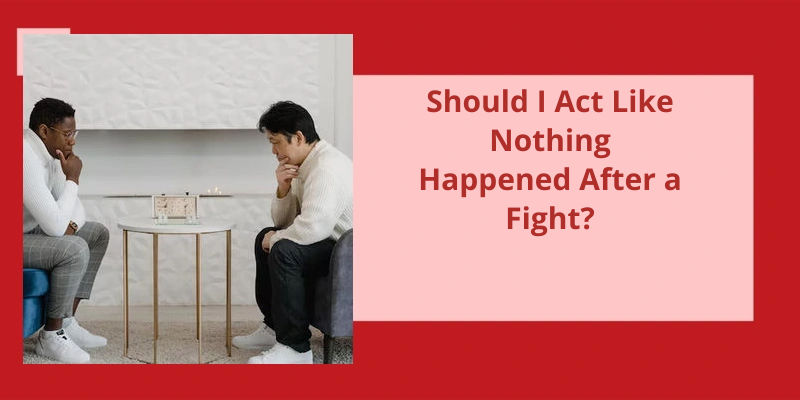It’s often tempting to act like nothing happened after a fight in a relationship, to brush off the tension and bury the conflict in hopes of smoothing over the rough edges. However, avoiding or ignoring the underlying issues that led to the fight isn’t a wise approach. Suppressing emotions or pretending that the argument never occurred may provide temporary relief, but it doesn’t address the root causes of the conflict, nor does it foster true understanding and resolution between partners. Instead, it’s important to acknowledge the fight, acknowledge the emotions that arose during it, and engage in open and honest communication to effectively resolve the conflict and strengthen the relationship. By facing the discomfort and working through the aftermath of a fight, couples have an opportunity to learn and grow together, ultimately deepening their connection and increasing their chances of long-term happiness. So, rather than acting like nothing happened, it’s crucial to approach fights in relationships with maturity, empathy, and a commitment to resolving conflicts constructively.
Is It Okay to Act Like Nothing Happened After an Argument?
It’s important to acknowledge and address the underlying issues that led to the conflict in the first place. Ignoring the problem can create a cycle of unresolved conflicts, ultimately damaging the relationship further. By pretending that nothing happened, you’re effectively avoiding the opportunity for growth and resolution.
Acting like nothing happened also dismisses the feelings and concerns of your partner. It sends the message that their emotions and experiences aren’t important or valid. This can create feelings of resentment and frustration, eroding the trust and intimacy within the relationship.
Additionally, acting as if nothing happened can lead to a buildup of unexpressed emotions and unresolved issues. This can create a toxic environment where both partners feel unheard and uncared for. It’s crucial to create a space where both individuals feel safe to express their thoughts and emotions, allowing for honest and open communication.
Instead of ignoring the conflict, consider addressing it head-on. Take the time to listen and understand your partners perspective, and share your own feelings and concerns honestly. This will facilitate a deeper understanding of each others needs and desires, and increase the chances of finding a resolution that satisfies both parties.
Acting like nothing happened after a fight isn’t a recommended approach. It’s important to acknowledge and address the underlying issues, communicate openly and honestly with your partner, and work towards finding a resolution that strengthens the relationship. Sweeping conflicts under the rug only perpetuates the cycle of unresolved issues and ultimately damages the connection between partners.
Strategies for Preventing Conflicts From Escalating in the Future
- Effective communication and active listening
- Promoting mutual understanding and empathy
- Implementing conflict resolution workshops and training programs
- Cultivating a positive and respectful work environment
- Encouraging open and honest feedback
- Establishing clearly defined expectations and guidelines
- Emphasizing the importance of compromise and negotiation
- Implementing regular team building activities
- Addressing conflicts promptly and directly
- Encouraging a culture of collaboration and teamwork
After a fight with your partner, it’s important to handle the aftermath with care. Instead of resorting to silence or denial, experts recommend giving each other space to cool down and process emotions. Acknowledging the disagreement, talking about it, and taking accountability are crucial steps towards resolving the conflict. Finally, it’s essential to come up with a game plan together to prevent similar conflicts in the future.
How Should I Act After a Fight?
After a heated disagreement or fight with your partner, it can be challenging to navigate the aftermath. Should you act like nothing happened, or address the issue head-on? Experts suggest that both partners give each other some space to cool down. Taking time to calm down can help prevent further escalation and facilitate a more productive conversation.
However, it’s crucial to avoid pretending like the fight didnt happen. Ignoring the issue not only diminishes the validity of your emotions, but it also prevents any resolution or growth in the relationship. Acknowledging the argument and it’s impact is essential for moving forward.
One common mistake people make after a fight is resorting to the silent treatment. This can create further tension and can be emotionally damaging. Instead, communicate with your partner and express your feelings about the argument. Talking about the fight helps in understanding each others perspectives and enables you both to find a resolution.
Taking accountability for your own words and actions is another key aspect to consider after a fight. Recognizing your part in the argument and accepting responsibility for any hurtful behavior is crucial for rebuilding trust and moving forward. This level of self-awareness also allows for more productive and open communication.
To prevent future conflicts, it’s essential to come up with a game plan together. This means discussing and identifying problematic behaviors or triggers that led to the fight and actively finding ways to address them. Creating an action plan together can promote healthier communication and prevent future fights.
Setting Boundaries: After a Fight, It Can Be Helpful to Establish Boundaries and Guidelines for How You Both Will Handle Disagreements in the Future. Setting Clear Expectations and Communication Guidelines Can Help Prevent Conflicts From Escalating and Provide a Sense of Security and Stability in the Relationship.
Setting boundaries is crucial after a fight in order to improve the situation. It’s essential to establish guidelines and expectations for handling disagreements in the future. By doing so, you can prevent conflicts from escalating and foster a sense of security and stability in your relationship. Clear communication and understanding of each other’s boundaries will help you both move forward and minimize the impact of past arguments.
Source: How to Make Up After a Fight: 6 Expert-Approved Tips | Paired
Healthy conflict is a normal part of human interactions, and it’s natural to feel awkward after a fight. However, many individuals aren’t equipped with the necessary skills to engage in effective and constructive arguments. Consequently, they make crucial mistakes during the altercation, leading to discomfort and tension for both parties involved.
Is It Normal to Feel Awkward After a Fight?
Is it normal to feel awkward after a fight? It’s just human nature. When emotions run high and tensions flare, conflicts are bound to surface in any relationship. However, the aftermath of a fight can often leave both parties feeling uncomfortable and unsure about how to proceed. The experience of awkwardness is a direct result of the way the fight was handled.
Most of us aren’t taught how to effectively manage conflict or engage in constructive arguments. Instead, we often resort to unhealthy communication patterns such as yelling, blaming, or shutting down. These approaches only serve to escalate tensions and prevent the resolution of the underlying issues. Consequently, both individuals involved in the fight may feel a lingering sense of unease and discomfort.
After a fight, it’s important to address the lingering tension rather than ignoring it. Acting like nothing happened may initially seem tempting as a way to avoid further conflict. However, it diminishes the opportunity for growth and reconciliation. Instead, it’s advisable to have an open and honest conversation about the fight, expressing feelings and thoughts surrounding it. This allows both individuals to understand each others perspectives, repair any damage caused, and strengthen the relationship moving forward.
Acknowledging the aftermath of a fight doesn’t mean dwelling on the negative emotions that may have arisen. It means creating a safe space where both parties can express their feelings and concerns, with the ultimate goal of finding a resolution and moving past the conflict. By doing so, the awkwardness can be transformed into a deeper understanding and appreciation of each others needs and boundaries.
However, it’s important to recognize that this discomfort is often the result of ineffective conflict resolution strategies. By learning how to fight constructively, addressing the tension after a fight, and engaging in open communication, individuals can overcome awkwardness and cultivate healthier, more resilient relationships.
Strategies for Repairing and Rebuilding Trust After a Fight
- Open and honest communication
- Taking responsibility for your actions
- Apologizing sincerely
- Listening empathetically
- Building a mutual understanding
- Showing consistency in behavior
- Being patient and understanding
- Respecting boundaries
- Working on forgiveness
- Seeking professional help if needed
Conclusion
Instead, it’s crucial to address the underlying issues that led to the conflict in the first place. By sweeping the problem under the rug, you’re only prolonging unresolved tension and allowing it to fester, potentially causing further harm. Communication is key in any relationship, and acknowledging the impact of a fight shows a willingness to work through difficulties together. By addressing and resolving conflicts, you’re fostering growth, understanding, and strengthening the foundation of your relationship. So, rather than acting like nothing happened, take the opportunity to have a constructive conversation, listen to one another's perspectives, and find a healthy resolution that allows you to move forward together.






